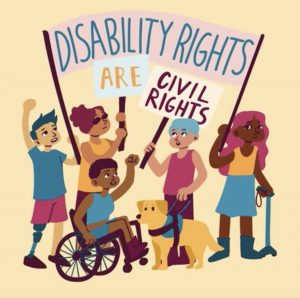 What is Disability Pride?
What is Disability Pride?
Disability Pride is celebrated in July each year because it coincides with the anniversary of the Americans with Disabilities Act (ADA), originally signed into law on July 26th, 1990. People with disabilities are protected under the ADA from discrimination based on their disabilities.
Disability Pride was first celebrated in Boston in 1990, and the first Disability Pride Parade was held in Chicago in 2004. New York City officially recognized Disability Pride Month in 2015, and many cities have since adopted their celebrations. However, there has been a shift in focus from Disability rights to Disability justice – and at the intersection of these important movements is Disability Pride. Disability rights is not a topic to shy away from or be perceived as taboo–the goal of celebrating Disability Pride empowers the queer-disabled community to share their stories and encourages the focus on inclusion for the queer-disabled community.
What does Disability Pride have to do with marriage equality?
Systemic discrimination within the social safety net system often disadvantages people who need help the most. For example, Social Security Disability Insurance (SSDI) and Supplemental Security Income (SSI) programs are supposed to help people with disabilities by providing monetary support. However, because of certain income requirements and tax restraints, receiving SSDI and SSI assistance can impact an individual’s ability to marry without incurring significant financial hardship.
Updating the SSI Laws offers an opportunity to shift from disability rights to disability justice. Under today’s rules, an individual receiving benefits cannot have more than $2000 in savings/assets, and a married couple cannot have more than $3000. If Disabled individuals marry partners with higher savings or assets, they risk losing their benefits entirely, regardless of whether the couple will be able to survive on a single partner’s income alone.
What does this have to do with financial security?
The maximum monthly amount someone can receive in benefits is $794, which is $712 less than the US poverty level. And if a disabled person were to take on part-time work or receive any other benefits, the SSI laws further restrict individuals’ ability to receive other benefits including… This has the perverse effect of making it nearly impossible to save for medical procedures and emergencies, defeating the purpose of a social safety net.
Queer folks already face economic disadvantages: housing, gender-affirming medical care, taxes, estate planning, and family planning (see our IG post for more details). Individuals that identify as both queer and disabled are at a double-disadvantage when it comes to financial security. Celebrating Disability Pride is both a celebration of the diversity within the queer-disabled community and an acknowledgment of the systemic injustice burdening the community. Disability rights, reproductive rights, marriage equality – these are all basic civil rights that should be guaranteed under a just system. Today, our fight to preserve and expand these rights are in jeopardy. Not only are there still no clear pathways for disabled people to obtain financial security at the cost of losing their benefits, but after Dobbs’s opinion, the right to marriage equality itself is on shaky ground.
Nobody should have to choose between the benefits they need in order to survive and marry the person they love. Marriage is hard enough without the added pressure of financial dependency on one partner. We will not have true marriage equality (or financial security) until disabled people can get married without fear of losing benefits.
Where do we go from here?
There is currently a bill in Congress with the potential to update disability benefits more equitably: The SSI Restoration Act.
Key changes proposed include eliminating the marriage penalty and raising the savings allowances to $10,000 for individuals and $20,000 for couples.
You can help by urging your congressional representative to support the bill. You can find your local members’ contact info here. You can also send them a personalized email. If enough of us show we care, we can truly make a difference and expand civil rights for all.
According to Patients Rising Now THE SSI RESTORATION ACT IS SUPPORTED BY:
S.2753: Sponsor Senator Sherrod Brown (D-OH) and cosponsors Senators Elizabeth Warren (D-MA), Mazie Hirono (D-HI), Dick Durbin (D-IL), Sheldon Whitehouse (D-RI), Richard Blumenthal (D-CT), Jeff Merkley (D-OR), Bernie Sanders (I-VT) Robert Casey (D-PA), Alex Padilla (D-CA), Tammy Baldwin (D-WI), Chris Van Hollen (D-MD), Ed Markey (D-MA), Cory Booker (D-NJ), Tammy Duckworth (D-IL), Ron Wyden (D-OR), Patty Murray (D-WA), Bob Menendez (D-NJ), Tina Smith (D-MN)

